Release of Report on “Access to Urban Basic Services in the Muslim Localities of Delhi (A Research Study)”
January 28, 2015 at Nehru Guest House of Jamia Millia Islamia, New Delhi
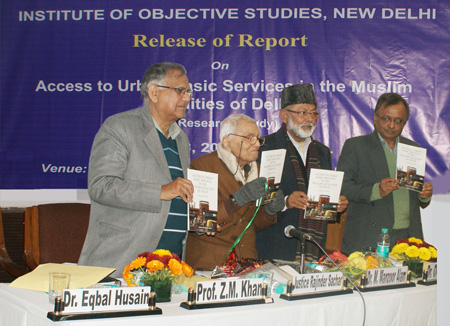
View of releases the report on “Access to Urban Basic Services in the Muslim Localities of Delhi (A Research Study)”
New Delhi, January 28: Former Chief Justice of Delhi High Court, Justice Rajinder Singh Sachar, released the report on “Access to Urban Basic Services in the Muslim Localities of Delhi (A Research Study)” here at a function organised by the Institute of Objective Studies at the Nehru Guest House of Jamia Millia Islamia. Delivering his address, he took the Modi government to task for omitting the words “secular” and “socialist” enshrined in the Preamble to the Constitution in an advertisement released by the Ministry of Information and Broadcasting, Government of India, in the newspapers on January 26, the Republic Day.
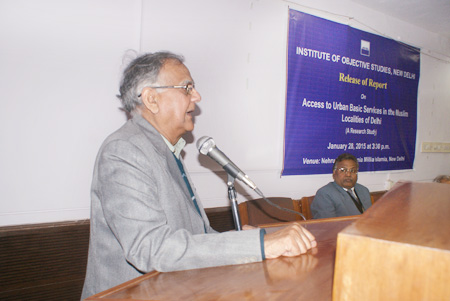
Speaker: Prof. ZM Khan, Secretary General IOS
He described it as mischievous and charged the present government with making an attempt to subvert the Constitution. He said that even the Supreme Court had reprimanded nine state governments for acting against socialism. He informed that he was contemplating to take legal recourse against the deletion of these words from the Preamble to the Constitution. Referring to the report on access to the urban basic services in Muslim localities, he noted that there were three big hospitals in the Jamia Nagar area. But access to them was altogether a different matter.
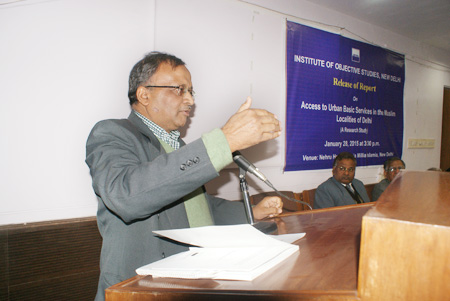
Speaker: Dr. Onkar Mittal, President, Civil Society Network
He said that 70 percent of Delhites could not afford to spend Rs. 60,000 on the education of their wards. He suggested that the MLAs and the Councilors of the area should be approached to find out where funds allotted for the basic civic facilities had gone. He observed that there was struggle between haves and have nots and another struggle was needed to end the strife. He said that the report was an instrument in our hands to ask questions from civic authorities. He made a reference to the concept of ‘Charkhamba Raj’ propounded by Dr. Rammanohar Lohia in this connection, and said the panchayat bodies should be assigned the task of managing civic affairs.
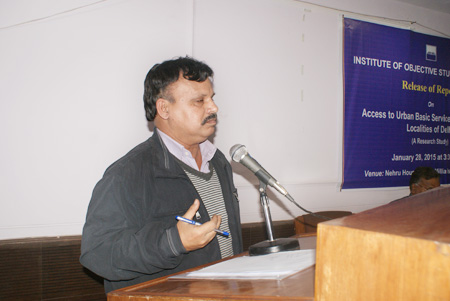
Speaker: Dr. Tarique Ashraf, Civil Society Network and the main researcher of the project
Calling for vigilance against right-wing lobbies in various ministries which were actively involved in creating controversies like deletion of “secular” and “socialist” clause, he asked the people to stand up now or else we would not be able to speak in future. He wanted to know if Narendra Modi would breach the oath of the Constitution he had taken at the time of swearing ceremony. He advised Narendra Modi to take some lesson from US President Barack Obama, who in his speech at Siri Fort auditorium, called for religious tolerance. He asked Narendra Modi to desist from rejoicing over Obama’s invitation and take note of his advice to act according to the provisions of Article 25 of the Constitution. He said that though it was an internal matter of India, Modi should take it seriously in view of the majoritarian nature of his government.
Introducing the Report, president, Civil Society Network, Dr. Onkar Mittal, explained that the research focused on 7 wards of Delhi which had 60 percent Muslim population. He said that the density of population in these areas was 30,000 per square k.m. adding that no money was spent on these localities during the last 5 years. While other areas adjoining the Muslim localities had access to all basic civic facilities the latter were at a disadvantage with no such facilities, prompting one to conclude that the Muslims were discriminated against. Blaming lack of political will to address the issue, he complained that the recognised colonies too were faced with the problem of blocked sewers. Dr. Tarique Ashraf of Civil Society Network and the main researcher of the project, held that the report was an eye-opener for lack of basic amenities like water, sewerage, etc.
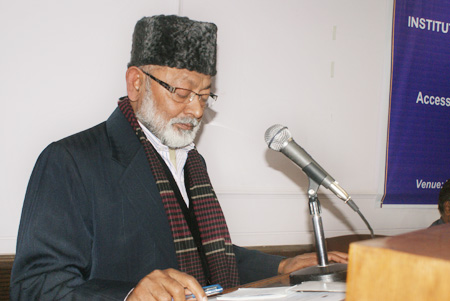
Speaker: Dr. Mohammad Manzoor Alam, Chairman, IOS
Chairman of the IOS, Dr. Mohammad Manzoor Alam, called upon the youth to come forward. Highlighting the activities of the IOS, he said that after its establishment in 1986, a conference on the empowerment of Muslims was organised in 1987. Such activities were continuing even today. The facts that had emerged from another report on Jamia Nagar, which was under preparation, were startling. It was a matter of concern that the Jamia Nagar area, which was considered to be more educated, had children who, instead of going to school, were engaged in doing different jobs, he said. He informed that similar studies had been undertaken on the Muslims in Uttarakhand and the weavers of Varanasi. He observed that so far the reports had indicated the backwardness of Muslims in every field of activity. He regretted that in several matters, the Supreme Court had take suo motto notice, but he had not come across any such matter pertaining to Muslims in which the court took suo motto notice.
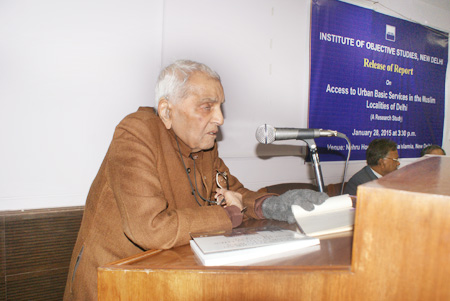
Speaker: Justice Rajinder Singh Sachar, Former Chief Justice of Delhi High Court
The Secretary General IOS, Prof. ZM Khan, in his welcome speech, emphasised the need for analysing and understanding things around us. Though we were the best among the third world countries, we could not compare ourselves with the US on Europe. Praising the Indian system of governance, he said that though there were certain ills like communal rights plaguing the country, the things were not beyond redemption. He observed that the IOS was working in the world of ideas and efforts were on to link IOS to ground work.
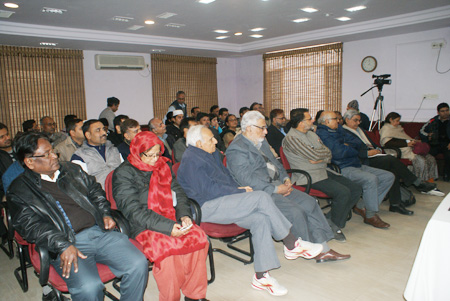
A view of audience
The IOS report on access to urban basic services in the Muslim localities of Delhi contains the findings of research undertaken by Civil Society Network, an NGO that claims that discrimination is being made against citizens on ground of religion. The report says “as these are basic ingredients of living conditions, it is also an inalienable right of citizens, it expects and demands from government to provide these basic facilities”. The capital city of Delhi is glittering with swanky shopping malls and multiplexes, metro rail and dotted with overbridges and underpasses in the wake of Common Wealth Games. The report further says the basic urban services of decent public transport, dispensaries, schools, parks, petrol pumps, gas agencies, banks apart, even the basic urban services like supply of potable water, minimum housing, garbage collection by municipal employees, regular cleaning of closed/open drains has not been made available in these localities, leading to filth, stink and disease. The situation is even worse in areas which are “exclusive Muslim pockets.”
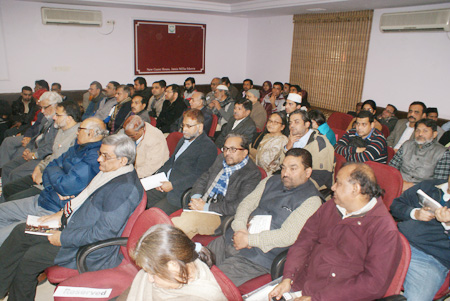
An other view of audience
The report says, “in this context it would be pertinent to explore the pattern of allocation and actual expenditure by various government agencies like Municipal Corporation, Delhi Government, Public Works Department and Central government in the habitations having predominantly Muslim population. In order to understand the genesis of problem at policy and governance level, it was proposed, to undertake a survey of access to urban basic services in selected Muslim localities in the city. At the same time it was decided to seek information through RTI Act and other sources, the pattern of government expenditure in these areas”.
Earlier, the function began with the recitation of a Quranic verse by Hafiz Athar Husain. Dr. Eqbal Husain, Associate Prof. of Law, JMI conducted the proceedings. Those present on the occasion included Vice-Chairman of the IOS, Prof. Refaqat Ali Khan, teachers and the students of Jamia Millia Islamia, journalists and intellectuals.
|